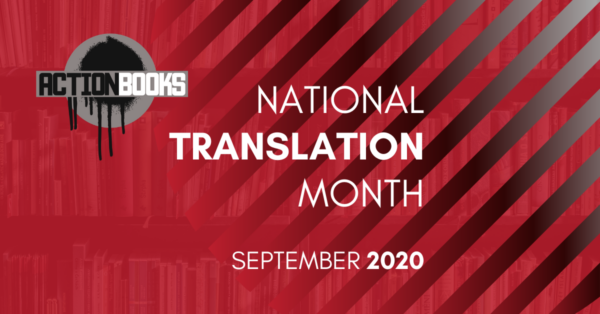gyna sapiens
lo primero que hay que hacer es respirar
entender que el aire
corre por los pulmones
sale por las comisuras de la nariz
relaja los músculos, los tensa, cae en la sangre
susurra al oído-
no estás sola
aquí también están todos los que han respirado antes que tú
todos los que insistieron segundo a segundo en palpitar
para que tú llegaras
tómate tu tiempo
haz tu trabajo
inhala, exhala
para todos los que necesitan que el aire les nutra la sangre
desde el inicio
hasta el principio
ellos requieren
vastas cantidades de éter
tú tan sólo eres una instancia en la infinita cadena
de la respiración
respiras
porque viniste a hacer lo que te toca
que nadie te quite el aire
que el aire no se estacione en ti
que no se enquiste en ti
que el aire en la sangre
abra cauce
que te traspase
como una espada.
gyna sapiens
the first thing to do is breathe
understand air
courses the lungs
exits the base of the nose
relaxes muscles, contracts them, runs in the blood
whispers in your ear:
you’re not alone
here are all those who’ve breathed before you
all those who insisted on pulsating second by second
so you’d appear
take your time
do your work
inhale, exhale
for all those who need air to fuel their blood
from origin
to beginning
they require
vast quantities of ether
you’re but one link in an infinite chain
of breathing
you breathe
because you came to take your turn
so no one takes your air
so the air doesn’t stall in you
doesn’t end in you
so the air in your blood
opens a riverbed
that runs through you
like a sword.
fotografía #51 de la molécula del adn
su padre no quiso
la ley, decía, la ley del torah
ordena que te conviertas en silenciosa mujer
igual, ella se fue desde la casa hasta la alquimia
a estudiar el espacio, el tiempo, la materia, la energía
y sus interacciones
hacia el universo ínfimo de la célula viajó
aprendió a montar pararrayos
cristales que atrapaban sombras de minúscula luz
en su desplazamiento
un buen día, una doble hélice
se develó ante su mirada
la ley
la ley del torah
otros le arrebataron la cristalografía
pasaron a definir el ensamblaje de las bases
se ganaron los aplausos
Rosalinda procedió a perderse
en el silencio de la historia
que encierran las piedras
su sombra fue otra de las sombras retratadas
en la imagen helicoidal y apareada
de donde nace la vida.
photograph #51 of a molecule of dna
her father refused
the law, they said, the law of the torah
commands you to become a silent woman
regardless she left the house for alchemy
to study space, time, matter, energy
and their interactions
she travelled all the way to the lowly world of the cell
learned to ride lightning rods
crystals that trapped the shadows of the tiniest light
in its displacement
one fine day, a double helix
appeared before her eyes
the law
the law of the torah
others stole her crystallography
proceeded to define the assembly of our bases
won applause
Rosalinda went on to lose herself
in the silence of history
that stones enclose
her shadow became one more of the shadows folded
into the helicoid and bonded image
of where life is born.

Mayra Santos-Febres (Carolina, Puerto Rico, 1966) studied literature for a BA from the University of Puerto Rico and an MA and PhD from Cornell University. She has taught at Cornell, Harvard, and various Latin American universities. She is a professor of literature in the Department of Hispanic Studies at the University of Puerto Rico in Río Piedras, and Director of Community and Cultural Relations for the university’s International and Multidisciplinary Institute. A widely anthologized and acclaimed writer, her many prizes include the prestigious Letras de Oro and the Premio Juan Rulfo for her short stories, and she was a finalist for the Premio Primavera for her novel Nuestra Señora de la Noche. She also has been awarded a Guggenheim Fellowship and a Rockefeller Bellagio Center Residency. Last year she won the National Prize in Literature from the National Academy of France for the French-language translation of her novel La amante de Gardel. Her work has been translated into French, English, German, Croatian, Korean, Icelandic, and Italian. She is the author of the books of poetry Anamú y manigua (1990), El orden escapado (1991), Boat People (2005), Tercer Mundo (2000), and Huracanada (2018), and the short-story collections Pez de vidrio y otros cuentos (1994), El cuerpo correcto (1996), Un pasado posible (2012)and Mujeres violentas. She has published the novels Sirena Selena vestida de pena (2000), Cualquier miércoles soy tuya (2002), Nuestra Señora de la noche (2006), Fe en disfraz (2009), and La amante de Gardel (2015); and the books of essays Sobre piel y papel (2005) and Tratado de medicina natural para hombres melancólicos (2011), and the children’s book Ernesto , El domador de los suenos (2008).

Seth Michelson is an award-winning poet, translator, and professor of poetry. He has published sixteen books of original poetry and poetry in translation. His most recent book of original poetry is Swimming Through Fire. As a translator, he focuses on feminist poetry from the hemispheric Americas, including Liliana Ancalao’s Women of the Big Sky. He also edited and translated the poetry anthology Dreaming America: Voices of Undocumented Youth in Maximum-Security Detention. All proceeds from its sale go to a legal defense fund for incarcerated undocumented youth.
